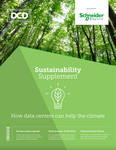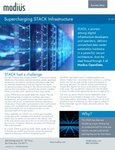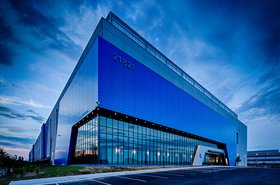What the outcomes of this year’s COP 26 UN climate change conference will mean for our industry is top of mind for us all right now. So I appreciated the opportunity Data Center Dynamics’ request to do a Q&A on recycling – its role, misperceptions, and untapped potential – gave me to highlight a topic that could have an outsized impact on the climate conversation: the adoption of recertified technology to radically reduce the amount of carbon our industry produces.
As a long-time vocal advocate for the business and environmental benefits of circularity, I believe that the IT industry should be doing everything possible to avoid from-scratch manufacturing and the massive amount of carbon it generates. Thinking differently about recycling is critical to our ability to do that. Unfortunately, often outdated perceptions or a reluctance to change the status quo get in the way.
Positively, at ITRenew we see increasing and accelerating momentum for developing and adopting more sustainable alternatives. Both the climate crisis and the current global supply chain shock are driving appetite and opportunity for recertified data center technology solutions. Crucially, not only does this migration yield huge environmental advantages, it delivers economic ones as well.
Read on for my email interview with Peter Judge of DCD on circular economic models, and why reuse should be seen as more than recycling.
DCD: Why is recycling a dirty word?
Ali Fenn: Recycling is not a dirty word. In fact, I’d posit that too many people think that recycling is actually a good answer to our global linear, wasteful economics models across industries. And that’s the problem.
While it is good, it is not sufficient. Instead people need to understand that recycling is the ‘least worst’ answer. It is, of course, better than landfilling, and we need to do a heck of a lot more of it… at the very minimum.
Where it gets much more interesting and impactful is when we shift to richer, more truly circular and regenerative models that seek first to reuse, repair, and remanufacture items for second lives, keeping them in their original, highest utility form for as long as possible. After these much more sustainable and valuable pathways have been exhausted, by all means, please recycle and not landfill materials.
DCD: Are people unwilling to accept the idea of using things that aren't new?
Ali Fenn: No! People are absolutely willing to use things that aren’t new. The certified, pre-owned car market is a fantastic example, and in March this year that industry hit its all time high, experiencing a 30 percent increase over the prior month. Per Mckinsey, the used car market in the US is 2x the new car market, with off-lease and certified pre-owned making used cars available much ‘younger,’ the significant majority of which are three years old or less.
This is exactly the opportunity we see for recertified data center solutions, and the ITRenew business model – best-in-class technology, like new performance, significant cost advantage, full warranty, and readily available, at scale in supply-constrained environments.
New attitudes towards reuse also reflect heightened awareness of sustainability issues, concern for the environment and an appreciation for the broader access to quality goods that circular economic models create. We see momentum building, not waning, for sure.
DCD: Does recycling and reuse sound terminally dull and dirty?
Ali Fenn: Views are changing and, in fact, ‘new’ has become the new dirty. The production of virgin materials creates far more carbon and negative environmental consequences than recertified ones.
In fact, nearly 75 percent of the carbon tied to the IT industry is attributed to new manufacturing. Recertified technology is the clean alternative, enabling those that adopt this approach to avoid generating all of those Scope 3, pre-use phase emissions.
As more organizations focus on ESG, and make carbon zero/negative commitments, what was once considered dull becomes far more exciting - for the companies themselves as well as their customers and stakeholders. We know of F100 enterprises that are requiring evaluation of recertified IT in their RFPs, we see global retailers moving to recertified solutions, and we see a significant increase in customers looking to achieve the best possible outcomes/$ in whatever what they can - provided the performance, solution integration, time to value, and support are first rate and exceed objectives.
DCD: Is this a problem?
Ali Fenn: Of course the shift to recertified solutions is a curve, and there are those who adopt earlier than others. Our experience is that enterprises and services providers across segments are moving up this curve quickly, and in bigger numbers, as our collective mindset evolves due to the climate crisis, budgets continue to shrink in the face of accelerated digital transformation demands, and the global supply shock severely hampers the availability of new IT solutions.
As with the CPO car market, I suspect once the model takes hold under the current conditions, it can become mainstream very quickly, especially as we work with partners across the ecosystem to quantify the financial advantages and positive carbon impact tied to the new model.





